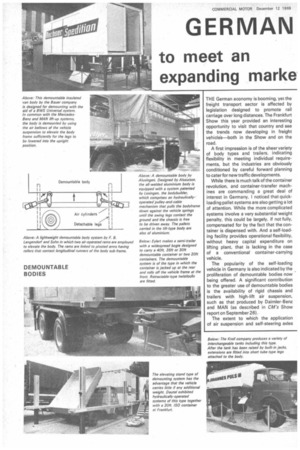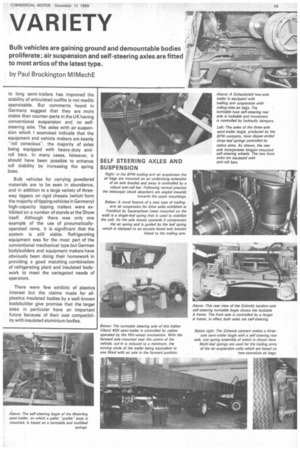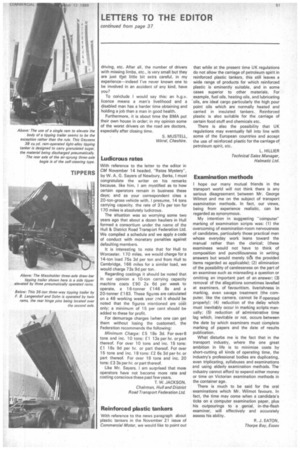GERMAN VARIETY
Page 86

Page 87

Page 89

If you've noticed an error in this article please click here to report it so we can fix it.
to meet an expanding marke
THE German economy is booming, yet the freight transport sector is affected by legislation designed to promote rail carriage over long distances. The Frankfurt Show this year provided an interesting opportunity to visit that country and see the trends now developing in freight vehicles—both in the Show and on the road.
A first impression is of the sheer variety of body types and trailers. indicating flexibility in meeting individual requirements, but the industries are obviously conditioned by careful forward planning to cater for new traffic developments.
While there is much talk of the container revolution, and container-transfer machines are commanding a great deal of interest in Germany, I noticed that quickloading pallet systems are also getting a lot of attention. While the more complicated systems involve a very substantial weight penalty, this could be largely, if not fully, compensated for by the fact that the container is dispensed with. And a self-loading facility provides operational flexibility, without heavy capital expenditure on lifting plant, that is lacking in the case of a conventional container-carrying vehicle.
The popularity of the self-loading vehicle in Germany is also indicated by the proliferation of demountable bodies now being offered. A significant contribution to the greater use of demountable bodies is the availability of rigid chassis and trailers with high-lift air suspension, such as that produced by Daimler-Benz and MAN as described in CM's Show report on September 26).
The extent to which the application of air suspension and self-steering axles to long semi-trailers has improved the stability of articulated outfits is not readily appraisable. But comments heard in Germany suggest that they are more stable than counter-parts in the UK having conventional suspension and no selfsteering axle. The axles with air suspension which I examined indicate that the equipment and vehicle makers are keenly "roll conscious", the majority of axles being equipped with heavy-duty anti roll bars. In many cases, however, it should have been possible to enhance roll stability by increasing the spring base.
Bulk vehicles for carrying powdered materials are to be seen in abundance, and in addition to a large variety of threeway tippers on rigid chassis (which form the majority of tipping vehicles in Germany) high-capacity tipping trailers were exhibited on a number of stands at the Show itself. Although there was only one example of the use of pneumaticallyoperated rams, it is significant that the system is still viable. Refrigerating equipment was for the most part of the conventional mechanical type but German bodybuilders and equipment makers have obviously been doing their homework in providing a good matching combination of refrigerating plant and insulated bodywork to meet the variegated needs of operators.
There were few exhibits of plastics interest but the claims made for allplastics insulated bodies by a well-known bodybuilder give promise that the larger sizes in particular have an important future because of their cost compatibil-. ity with insulated aluminium bodies. driving, etc. After all, the number of drivers with missing limbs, etc., is very small but they are just that little bit extra careful, in my experience—indeed I've never known one to be involved in an accident of any kind, have you?
To conclude I would say this: an h.g.v, licence means a man's livelihood and a disabled man has a harder time obtaining and holding a job than a man in good health.
Furthermore, it is about time the BMA put their own house in order; in my opinion some of the worst drivers on the road are doctors, especially after closing time.
S. MUSTELL, Wirral, Cheshire.
Ludicrous rates With reference to the letter to the editor in CM November 14 headed, "Rates Mystery", by W. A. G. Sayers of Newbury, Berks, I must congratulate the writer on his remarks because, like him, i am mystified as to how certain operators remain in business these days; and as your correspondent cites a 20-ton-gross vehicle with. I presume, 14 tons carrying capacity, the rate of 37s per ton for 170 miles is absolutely ludicrous.
The situation was so worrying some two years ago that about a dozen hauliers in Hull formed a consortium under the name of the Hull & District Road Transport Federation Ltd. We compiled a schedule and we apply a code of conduct with monetary penalties against defaulting members.
It is interesting to note that for Hull to Worcester, 170 miles, we would charge for a 14-ton load 75s 3d per ton and from Hull to Cambridge, 166 miles for a similar load, we would charge 73s 9d per ton.
Regarding costings it should be noted that in our opinion a 10-ton carrying capacity machine costs £90 2s 6d per week to operate, a 16-tonner £146 8s and a 20-tonner £183. These figures are calculated on a 46 working week year ond it should be noted that the figures mentioned are cost only; a minimum of 15 per cent should be added to these for profit.
For demurrage charges (when one can get them without losing the customer), the Federation recommends the following: Minimum Charge: E5 18s 3d. For over 6 tons and inc. 10 tons: £1 13s per hr. or part thereof. For over 10 tons and inc. 15 tons: £1 18s 9d per hr, or part thereof. For over 15 tons and inc. 18 tons: £2 6s 3d per hr. or part thereof. For over 18 tons and inc. 20 tons: £3 3s per hr. or pad thereof.
Like Mr. Sayers, I am surprised that more operators have not become more rate and costing conscious these past few years.
T. W. JACKSON, Chairman, Hull and District Road Transport Federation Ltd.
Reinforced plastic tankers
With reference to the news paragraph about plastic tankers in the November 21 issue of Commercial Motor, we would like to point out that while at the present time UK regulations do not allow the carriage of petroleum spirit in reinforced plastic tankers, this still leaves a wide range of products for which reinforced plastic is eminently suitable, and in some cases superior to other materials. For example, fuel oils, heating oils, and lubricating oils, are ideal cargo particularly the high pour point oils which are normally heated and carried in insulated tankers. Reinforced plastic is also suitable for the carriage of certain food stuff and chemicals etc.
There is also the possibility that UK regulations may eventually fall into line with some of the European countries and accept the use of reinforced plastic for the carriage of petroleum spirit, etc.
L. HILLIER Technical Sales Manager, Halmatic Ltd,
Examination methods
I hope our many mutual friends in the transport world will not think there is any serious disagreement between Mr. George Wilmot and me on the subject of transport examination methods. In fact, our views, being from experience realistic, can be regarded as synonymous.
My intention in suggesting "computer" marking of examination scripts was: (1) the overcoming of examination-room nervousness of candidates, particularly those practical men whose everyday work leans toward the manual rather than the clerical; (these examinees would not have to think of composition and punctiliousness in writing answers but would merely tiek the provided items regarded as applicable); (2) elimination of the possibility of carelessness on the part of an examinee such as misreading a question or omitting an important part of an answer; 13) removal of the allegations sometimes levelled at examiners, of favouritism. liverishness in marking, even savage treatment (the computer. like the camera, cannot lie if operated properly); (4) reduction of the delay which must inevitably occur in marking scripts manually; (5) reduction of administrative time lag which, inevitable or not, occurs between the date by which examiners must complete marking of papers and the date of results publication.
What disturbs me is the fact that in the transport industry, where the one great ambition in life is to minimize costs by short-cutting all kinds of operating time, the industry's professional bodies are duplicating, even triplicating, syllabuses and examinations and using elderly examination methods. The • industry cannot afford to expend either money or time on Victorian examination methods in the container age.
There is much to be said for the oral examinations which Mr. Wilmot favours. In fact, the time may come when a candidate's ticks on a computer examination paper, plus his outpourings to a genial, in-the-flesh examiner, will effectively and accurately assess his ability.
R. J. EATON, Thorpe Bay, Essex
























































































































































